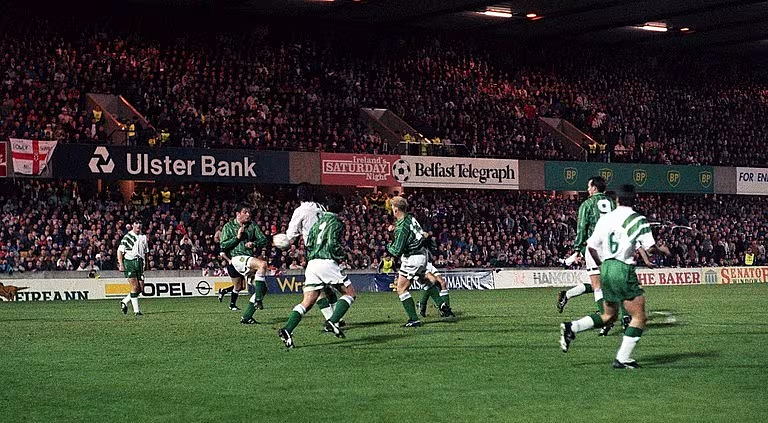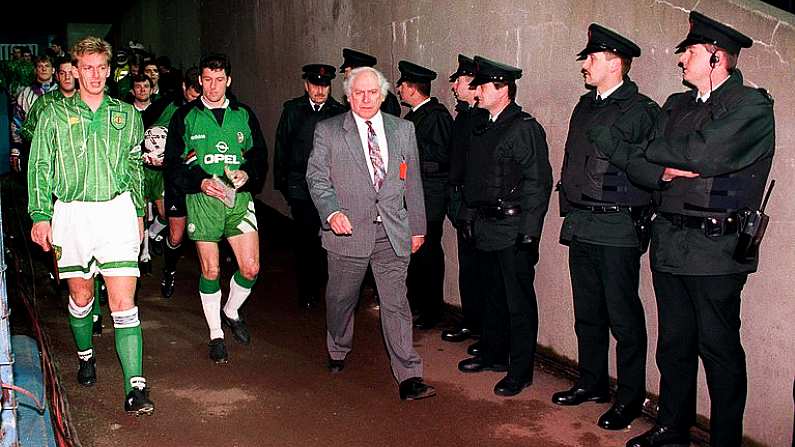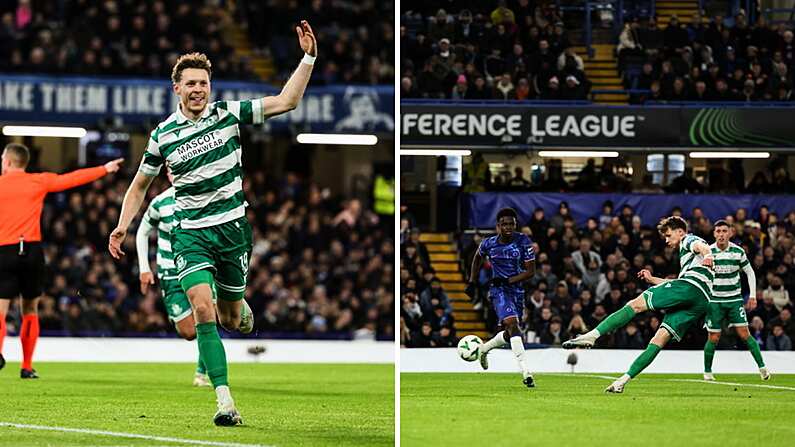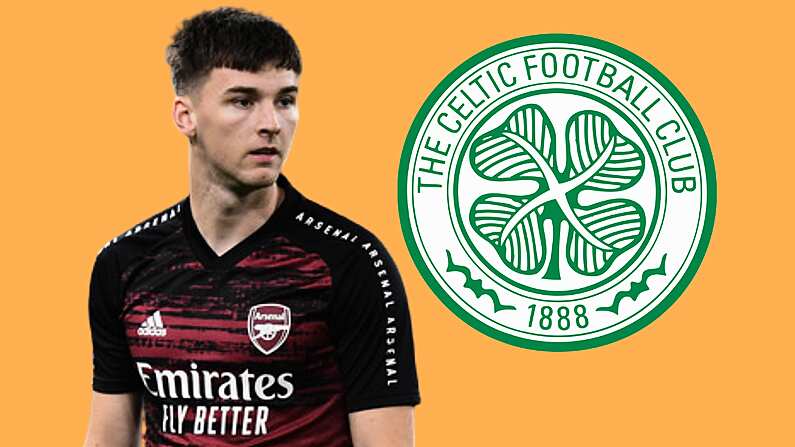27 years ago today. Windsor Park, 1993. With the clock winding down, the score was 1-0 and the Republic of Ireland were looking defeat in the face. This was also a night when a majority was forced to look into the eyes of their discontent companions and register their troubled existence.
“Two of the guys I drove up with thought Northern Ireland wanted us to go through and were going to let us win,” says Gary Spain, a Republic of Ireland fan who travelled to Windsor Park that day.
“That sounds just so ridiculous now, but I think a lot of people were shocked that they wanted to stop us going to the World Cup. It meant even more for them to stop us going than it did for us to qualify. I think that was a bit of an eye-opener.”
“There was an added incentive because you are playing against the Republic of Ireland and you don’t want them to have bragging rights. They were in a position to go to a World Cup, we were in a position to stop it,” explains Kevin Wilson, Northern Ireland’s starting right winger that day.
Northern Ireland manager Billy Bingham stoked the flames before the game when he hit out at Ireland’s “mercenaries” who had qualified for the Republic through family. “I take a totally cynical view of the whole business. I am not prepared to skirt the issue, the same as I am happy to state it is our intention to stuff the Republic,” he declared. He would later withdraw his remarks.
“Football was Northern Ireland’s number one sport at the time – and still is. The fans loved Northern Ireland boss Billy Bingham, who sadly suffers badly from dementia now, for taking us to two World Cups. Our team and Bingham were on the wane at that time, while the Republic were on the up,” clarifies Nigel Tilson, now a senior media manager with the IFA and a young fan who was in Windsor Park at that World Cup Qualifier.
“It forced the well-coddled people of the Republic to acknowledge elsewhere on this small island was indeed troubled and different,” wrote Fintan O’Toole of the Irish Times, who was also in attendance that historic day.
“In those days, we were only known for two things; one was killing each other like maniacs. The other was our football team,” pronounces Richard Cathcart, a devote Northern Ireland fan who sat in the South Stand for the match.
Alan McLoughlin's 76-minute snap volley secured a vital 1-1 and propelled the Republic to qualification.

It was a day that illustrated just how much football is enwrapped in Irish self-identity, on both sides of the border. A game that demonstrated why it is, in fact, more than a game and the simultaneous joy and despair that permeated the island at the time.
**************************************************************
Jack Charlton’s quest to steer Ireland to the 1994 World Cup became the perfect nihilist recipe for disaster. Three teams were still in the running for qualification from Group 3; Spain, Denmark and the Republic of Ireland. A draw was good enough for Denmark, the other two knew they would require a win. As it turns out, a draw for Charlton’s charges proved enough thanks to a 1-0 victory for Spain in Sevilla.

To pit two Irelands against one another, both of whom revelled in their difference from the other, would always prove difficult but circumstances conspired to heighten the tension. A month earlier, 23 people were killed in numerous massacres. They bombed innocent citizens in fish shops and shot them in pubs. Tit-for-tat violence that thrust a community into irremediable anguish.
The events that unfolded on the pitch that night have been extensively expressed by the Irish players who experienced them and repeatedly reported by the Irish media in years since.
The account of the foul racism fired towards Terry Phelan and Paul McGrath, who were called ‘nigger’ and ‘fenian bastard.’ The scurrilous sectarianism, calls of ‘fucking lundy’ and the treatment Alan Kernaghan was subjected to because he had played for Northern Ireland at schoolboy level.
The tale of Jack Charlton almost launching himself at Tony Cascarino after turning to bring him on and realising ‘Tony Goal’ had forgotten to wear his jersey. The foul feud between Charlton and Billy Bingham that saw them confront each other at the final whistle.
All articulated, expertly established into the archives and assured of their place in Irish football history.
This is not that story. This is the story of four men who were in attendance that day. The story of an entirely different experience of Ireland and an entirely different experience of football recounted to someone who experienced neither.

Kevin Wilson laughs at the idea he is speaking to a journalist who was not alive for that game. He stresses that while the tension on the terraces was palpable, the unabridged animosity did not truly extend past the white line.
“There was always that added rivalry between the Republic and the North. It was one hell of an atmosphere. At one stage we looked like we were going to stop their progression.”
Look, there was a lot of players who played with each other in the English First Division at the time. There were players at certain clubs you knew quite well. After the game was finished it was forgotten, I sat down and had a sandwich and a drink with some of them.
What I mean is after the game, there was no animosity. It reminded me of a bit of a local derby, I played in local derbies for Chelsea, against Arsenal or Tottenham.
“I knew these guys. I knew Ray Houghton, John Aldridge, I’d come across other players who were in the squad as well.”

Bingham’s jibe at Ireland’s players who were eligible through birthright was particularly close to the bone for Wilson. The Banbury-born striker qualified for Northern Ireland through his Dungiven mother.
"A lot of stuff was put out in the press for a reaction rather than any… sometimes it is put out and it is not true. Unfortunately, it was put out there. That was our last game and we wanted to finish with a good result. Then it was more poignant because it was our neighbours.
"We really wanted a result… ‘Mercenaries?’ Look, it was no different to myself. I was really proud to put on the Northern Irish shirt. Hopefully, people saw that across 42 caps, I tried to really battle. It was a great privilege. I think, or I hope, you could see that on the pitch, for everyone."
Irish Football Association senior media relations manager Nigel Tilson responds by email for this article and is refreshingly detailed about his memories of the game. Football, he stresses, was panoptic for Northern Irish fans.
"Our team and Bingham were on the wane at that time, while the Republic were on the up and had a better team. However, Northern Ireland fans will back their team through thick and thin."
“Away from this international game, football was played right across the community and was inclusive rather than divisive.
“I personally played in cross-community teams for 25 years and the craic was always good. Yes, there was some Rangers/Celtic banter, but it was only ever banter.”
Tilson tells of sectarian chanting, distributed by a “vocal minority.” Limerick man Gary Spain also remembers it like that. He has been a constant presence at Republic of Ireland fixtures for 30 years. In fact, Spain suggests he may now be the sole individual with season tickets for both the FAI and IFA.
Then 27-years-old, Spain was working in Galway and had attended the Republic of Ireland’s previous 11 qualification games. Now it is his firm belief that recollections of the Windsor Park game are often overblown.
I didn’t realise how bad it was until I got back to Galway. I was reminded of Con Houlihan who said about Italia 90, ‘I missed Italia 90. I was in Italy at the time.’ Now, don’t get me wrong, it was bad, but by no means the worst atmosphere I have experienced.
That honour goes to a 1989 game at Southend against Reading in the old third division. A “meaningless game to decide on 11th place” which he attended with a girl he knew at the time who obtained two tickets in the home stand. She was a Reading supporter and jumped for joy when they scored a late equaliser.
“I said ‘oh, big deal. Crap match. Undeserved equaliser.’ She then got hit, we got terrible abuse. It was horrific stuff. Southend got a winner two minutes later and I was relieved because I didn’t know if we’d get out. There was a guy in my face waving his fist, ‘take that!’ I said nothing. Just sat there, but I felt like ‘I don’t care about this. I really don’t. It is an insignificant event. It doesn’t matter.”
But it did to them. Whether it was an outlet, a sense of identity or filling a void, football impacts the collective self. This is the desperate irony at the heart of the sport. Its unifying power can make the spectator feel a part of something, a key cog in a united ‘team of us.’ Yet for there to be an ‘us’, there must be a ‘them.’ To deeply identify with those of a shared ideology is to oppose those of another.
Football can unite, but it can also divide.
Spain hesitates when pressed on his motivation to attend the fixture, before eloquently referencing that point and explaining it was about being part of something.
"I'd gone to them all and... young and foolish might be a fair comment, I just didn’t want to miss it. Maybe the other thing is, it wasn’t so much that the game itself was considered dangerous but the whole point of going to Northern Ireland.
It was in the context of the Shankill Road and the context of Greysteel. Looking back it sounds ridiculous, but they could just stop a car with a Galway reg, take the guys out and shoot them. I mean that was a concern.
If you were driving through the wrong area, that was more of a concern than driving through Northern Ireland and where you end up or going the wrong place. I’d been before, quite a few times, but it was a particularly bad time to go there. Probably the worst I can remember. They might say back in the early 70s but I was too young to remember that.
"That period in October and November 93 was as bad as the Troubles were in 20 years. This felt as dangerous a time to go up there."
Not only did Spain enter the lion's den, but he also went on to poke the lion.
"It looked like we were dead and buried and we weren't going to the World Cup, then we equalised. I was just in the depths of despair when they scored. There were three or four minutes, I thought 'we were gone' and then we scored and I just lost it. I was up in the air and then it was a case of 'oh shit! what have I done.' But having said that, the home fans didn't really react. I think it was shock."

Richard Cathcart is a Fermanagh native who has supported Northern Ireland since the 1970s. He was raised six miles from the border and had a childhood defined by its changing denotation.
"When I was very young, before the Troubles really started, we often went across to Cavan, Monaghan, Sligo, Bundoran, that sort of thing. But when the Troubles started, whilst we still did to a certain extent, there was a noticeable drop.
"I mean we had a shop, we sold petrol and stuff like that. We used to get a lot of passing trade from the Republic, or the Free State as we called it in those days. It didn’t quite stop completely. But, it just fell off most markedly. For obvious reasons, people from south of the border were reluctant to come... So by the time we got to 1993, you are talking nearly a quarter of a century of trouble.
"You see, I had an older brother and sister who went to university in Dublin, I had friends from the Republic. For me travelling south of the border was not such a big thing but for an awful lot of people in the Republic, the reverse journey was incomprehensible, perfectly understandable."
"As a result, there was a real lack of understanding of just what the hell was going on in Northern Ireland. Whether it be football or the wider situation. Again, I wouldn’t blame them. I lived there and I didn’t understand it. A quote that comes to mind is 'If you are not confused, you don't know what is going on.'"
Like thousands from this isle, Cathcart fled the North for work in England. Yet his heart remained with Billy Bingham's team and he travelled across the channel and beyond to support them, by no means an inexpensive feat in that pre-Ryanair era.
That was what compelled him to fly home for the World Cup qualifier. Northern Ireland could not qualify, but it was Bingham's last game. A farewell to a coach who orchestrated Northern Ireland's adventures to the World Cup finals in Spain and Mexico.
Prior to the game, an idea had been mooted that it should be played in Wembley or Manchester due to the climate. This was something Jack Charlton indicated he was in favour of, but Cathcart explains it was an unworkable compromise for the Windsor Park faithful.
"The idea the game should be played in England, we had gone through a period from 1971 and 1975 when we had to play all our games away from home. I know that because my first game was in 1970 so I saw home games and then we had to suffer four years because of the Troubles and an IRA threat...
"Although this game we are talking about was 20 years later, I think a lot of Northern Ireland fans were sensitive to the idea that we would have to play games away from home unless it was absolutely necessary. We had played the Republic in 1979 and it had passed peacefully."
I don’t blame Charlton, I think it was just he may have been better advised. We had done it before, why couldn’t we do it with this one? We were going to be deprived of this game, Billy Bingham was going to be deprived of his game. That was part of the background to the game itself that doesn’t always get told.
I can understand why Charlton, particularly wouldn’t like to see it played in Northern Ireland from a security point of view but let's be honest, his team had a better chance at a neutral venue instead of an away one. That wasn’t appreciated amongst Northern Ireland fans, our attitude was if you don’t want to play it throw the game.

The game would always prove a lightning rod for sectarian chanting and Cathcart speaks with barely controlled emotion on this. The reputation of their entire fanbase suffered as a result of that night and that is a source of shame.
There is no doubt that a section of our support behaved disgracefully. In terms of their booing, jeering, sectarian comments, that happened. A game like that was always going to attract a certain mob, who probably weren't at the previous game or the next game. This was their opportunity to come along.
It is disgraceful. It is embarrassing for regular fans like myself. These hangers-on emerge every now and again for certain games.
At the same time, Cathcart hopes the record reflects events accurately, or at least as he perceives them. "There was an urban myth that Billy Bingham was conducting the crowd, singing the Billy boys, which is a nasty song. That is an absolute lie and I can tell you how it was.
"Basically, the dressing room at Windsor park was situated in the north-west. As the teams came out in the second half, Billy Bingham made his way down the touchline to the dugout on the halfway line. I was sitting in that stand, a close-up view.
"At that point, the Northern Ireland fans were singing ‘one team in Ireland, there is only one team in Ireland’ a jibe at our opponents. Billy picked up on it and he laughed, he then waved to the crowd. That was it, the entirety of it. Yet the story came out afterwards."
Another source of irritation is the monodrama play 'A Night in November,' written by Marie Jones about a fictional Protestant Northern Ireland fan who converts to support the Republic for the 1994 World Cup after seeing the hatred directed towards them that evening in Windsor Park.
"It is a nice story if you live in Hollywood, California, but it has no bearing or reality if you live in Hollywood, County Down," he argues.
Take away the political sensitivities and religion, it is a nice story if we were talking about Iran and Iraq. I guess like Escape to victory, a Northern Ireland version. That really irked us because she had no idea about the implication of a committed Northern Ireland fan turning to watch the Republic… it just doesn’t happen. A Bohs fan doesn’t suddenly became a Shamrock Rovers fan. A Rangers fan doesn’t turn to Celtic.
He now hopes Northern Ireland fans are recognised for being about more that night's hostilities. "Football fans are not a monolith," he explains. The 20,000 who recently travelled to France for Euro 2016 are a testament to that. Gary Spain is similarly upbeat about the modern fanbase and praises the family-orientated stadium.
For Cathcart, It still lingers, but there is a spine to the Northern Irish fanbase determined to evolve.
"I know what football can do. There is a feel-good factor with this team the last few years. Over the last ten, fifteen years the atmosphere and the crowd and the behaviour has been transformed. There is no question about that. There is power, a feel-good factor and a manager who has rescued us from the doldrums.
"You can never underestimate the importance of a bit of success. Who knows what it will be like if we actually win a game!"
"The hangers-on, the Billy boys, that crowd have just been swamped out now. They have been crowded out now. I’m not saying they are extinct but they do not have the same profile or impact as they used to have in those days."
Football would remain intertwined with the turmoil of the time. It was never more apparent than in 1994, when Irish fans eager to watch the Republic's first World Cup game in the Heights bar in the village of Loughinisland, Co Down were gunned down by two UVF gunmen. Six people died. The Good Friday agreement brought an end to those dark days, for the betterment of the island.
**************************************************************
In researching for this article, it is interesting to note Paul McGrath's description of football's significance in Irish society at the time.
"I sometimes look back at videos of that time. Not so much the games, but the footage of the people. The deserted streets when we were playing. The carnivals when we won. The mix of old and young, male and female, everyone just caught up helplessly in the surging, feel-good wave.
"I'm not sure Ireland will ever see its like again."
Back from the brink, Paul McGrath Autobiography
Does football mean less now? This is a different Ireland and much of that is to be celebrated. One mad night in Windsor Park represents a cohort passionate about their football and their identity. A serene experience is by no means a lesser one.












